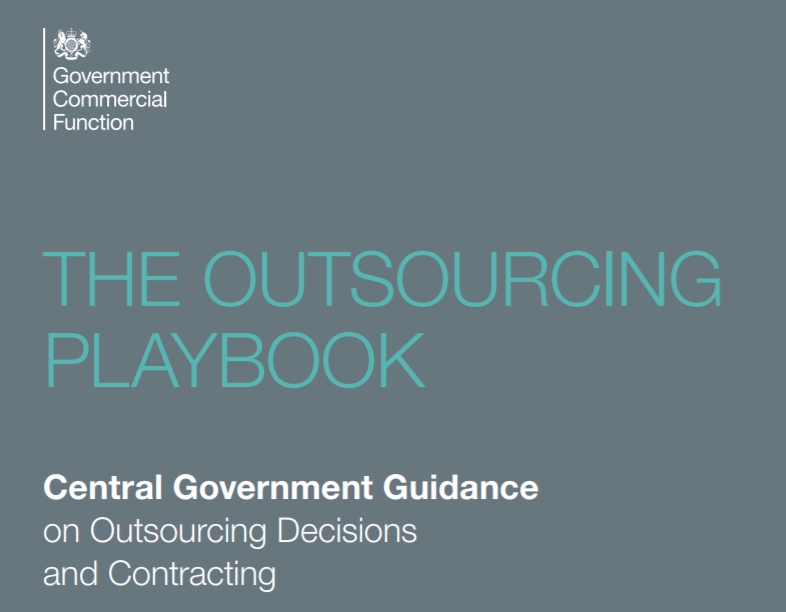Outsourcing playbook
The government’s Outsourcing Playbook, designed to improve how government works with industry and deliver better public services, was launched on February 20, 2019 by Cabinet Office Minister, Oliver Dowden.
The Playbook is intended to ensure the government gets more projects right from the start, engages with a diverse and healthy marketplace of companies, including small businesses and charities, and is ready when things go wrong.
This follows reforms announced by the Chancellor of the Duchy of Lancaster and Minister for the Cabinet Office, David Lidington, to ensure that government procurement is fit for the future, including putting social values at the heart of public service delivery.
New measures announced at the launch include changes to how government allocates risk between itself and its suppliers, ensuring contracts are set-up for success, and for the public to be provided with the best possible service.
The government is also taking steps to improve the design of outsourcing projects from their inception. New complex contracts will be piloted with the private sector before rolling out fully, enabling the government to learn from experience and deliver better public services.
Speaking to CBI business leaders at the launch, Oliver Dowden said:
“Outsourcing can deliver significant benefits, including value for money and more innovative public services. Our new measures will improve how the government works with industry and provide better public services for people across the country.
“I can today provide reassurance that the Playbook makes explicit that, when designing contracts, departments must seek to mitigate, reduce and then allocate risks to the party best able to manage it. A more considered approach to risk allocation will make us a smarter, more attractive client to do business with.”
Jon Lewis, the CEO of Capita, one of the suppliers which government worked with to develop the new measures, said:
“Capita is working closely with government to develop these reforms. This is a sea-change, both recognising the vital contribution the private sector makes in delivering first-rate public services, and then finding ways to do this even better.
“These new ways of working will place a stronger focus on establishing partnerships based on mutual trust and a joint focus on positive outcomes. This is fundamental to the successful procurement and delivery of public-sector contracts.”
Further measures in the Playbook include:
- Key performance indicators from every new outsourcing contract will be made publicly available.
- Resolution plans (living wills) for the rare event of a supplier’s corporate failure.
- Departments will be required to publish their upcoming requirements, to help suppliers plan ahead.
- Make-versus-buy decisions to identify when it is best to deliver public services in-house or when there is benefit to drawing on the expertise of the private sector.
You can find the Playbook at: https://www.gov.uk/government/publications/the-outsourcing-playbook
[edit] Related articles on Designing Buildings Wiki
- Business process outsourcing (BPO).
- Business model.
- Carillion.
- Construction organisation design.
- Construction organisations and strategy.
- Consultancy playbook.
- Consultancy vs contingent labour.
- Critical service contracts.
- Critical suppliers.
- Expected market cost.
- Funding options.
- Government procurement post-Carillion.
- Insourcing.
- Joint venture.
- Mixed economy.
- Model Services Contract MSC.
- Partnering.
- PFI.
- Public sector dependent suppliers.
- Sourcing playbook.
- Spark framework RM6094.
- Suppliers.
- Types of construction organisation.
- Vested outsourcing.
Featured articles and news
Ebenezer Howard: inventor of the garden city. Book review.
The Grenfell Tower fire, eight years on
A time to pause and reflect as Dubai tower block fire reported just before anniversary.
Airtightness Topic Guide BSRIA TG 27/2025
Explaining the basics of airtightness, what it is, why it's important, when it's required and how it's carried out.
Construction contract awards hit lowest point of 2025
Plummeting for second consecutive month, intensifying concerns for housing and infrastructure goals.
Understanding Mental Health in the Built Environment 2025
Examining the state of mental health in construction, shedding light on levels of stress, anxiety and depression.
The benefits of engaging with insulation manufacturers
When considering ground floor constructions.
Lighting Industry endorses Blueprint for Electrification
The Lighting Industry Association fully supports the ECA Blueprint as a timely, urgent call to action.
BSRIA Sentinel Clerk of Works Training Case Study
Strengthening expertise to enhance service delivery with integrated cutting-edge industry knowledge.
Impact report from the Supply Chain Sustainability School
Free sustainability skills, training and support delivered to thousands of UK companies to help cut carbon.
The Building Safety Forum at the Installershow 2025
With speakers confirmed for 24 June as part of Building Safety Week.
The UK’s largest air pollution campaign.
Future Homes Standard, now includes solar, but what else?
Will the new standard, due to in the Autumn, go far enough in terms of performance ?
BSRIA Briefing: Cleaner Air, Better tomorrow
A look back at issues relating to inside and outside air quality, discussed during the BSRIA briefing in 2023.
Restoring Abbotsford's hothouse
Bringing the writer Walter Scott's garden to life.
Reflections on the spending review with CIAT.
Retired firefighter cycles world to raise Grenfell funds
Leaving on 14 June 2025 Stephen will raise money for youth and schools through the Grenfell Foundation.
Key points for construction at a glance with industry reactions.























